- Home
- Brandon Sanderson
Arcanum Unbounded: The Cosmere Collection Page 6
Arcanum Unbounded: The Cosmere Collection Read online
Page 6
“I am one.”
“A real one.”
“I am one.”
Gaotona shook his head. “Frava’s painting … there is something we are missing about it, isn’t there? She had the forgery inspected, and the assessors found a few tiny mistakes. I couldn’t see them without help—but they are there. Upon reflection, they seem odd to me. The strokes are impeccable, masterly even. The style is a perfect match. If you could manage that, why would you have made such errors as putting the moon too low? It’s a subtle mistake, but it occurs to me that you would never have made such an error—not unintentionally, at least.”
Shai turned to get another seal.
“The painting they think is the original,” Gaotona said, “the one hanging in Frava’s office right now … It’s a fake too, isn’t it?”
“Yes,” Shai admitted with a sigh. “I swapped the paintings a few days before trying for the scepter; I was investigating palace security. I sneaked into the gallery, entered Frava’s offices, and made the change as a test.”
“So the one they assume is fake, it must be the original,” Gaotona said, smiling. “You painted those mistakes over the original to make it seem like it was a replica!”
“Actually, no,” Shai said. “Though I have used that trick in the past. They’re both fakes. One is simply the obvious fake, planted to be discovered in case something went wrong.”
“So the original is still hidden somewhere…” Gaotona said, sounding curious. “You sneaked into the palace to investigate security, then you replaced the original painting with a copy. You left a second, slightly worse copy in your room as a false trail. If you were found out while sneaking in—or if you were for some reason sold out by an ally—we would search your room and find the poor copy, and assume that you hadn’t yet accomplished your swap. The officers would take the good copy and believe it to be authentic. That way, no one would keep looking for the original.”
“More or less.”
“That’s very clever,” Gaotona said. “Why, if you were captured sneaking into the palace trying to steal the scepter, you could confess that you were trying to steal only the painting. A search of your room would turn up the fake, and you’d be charged with attempted theft from an individual, in this case Frava, which is a much lesser crime than trying to steal an imperial relic. You would get ten years of labor instead of a death sentence.”
“Unfortunately,” Shai said, “I was betrayed at the wrong moment. The Fool arranged for me to be caught after I’d left the gallery with the scepter.”
“But what of the original painting? Where did you hide it?” He hesitated. “It’s still in the palace, isn’t it?”
“After a fashion.”
Gaotona looked at her, still smiling.
“I burned it,” Shai said.
The smile vanished immediately. “You lie.”
“Not this time, old man,” Shai said. “The painting wasn’t worth the risk to get it out of the gallery. I only pulled that swap to test security. I got the fake in easily; people aren’t searched going in, only coming out. The scepter was my true goal. Stealing the painting was secondary. After I replaced it, I tossed the original into one of the main gallery hearths.”
“That’s horrible,” Gaotona said. “It was an original ShuXen, his greatest masterpiece! He’s gone blind, and can no longer paint. Do you realize the cost…” He sputtered. “I don’t understand. Why, why would you do something like that?”
“It doesn’t matter. No one will know what I’ve done. They will keep looking at the fake and be satisfied, so there’s no harm done.”
“That painting was a priceless work of art!” Gaotona glared at her. “Your swap of it was about pride and nothing else. You didn’t care about selling the original. You just wanted your copy hanging in the gallery instead. You destroyed something wonderful so that you could elevate yourself!”
She shrugged. There was more to the story, but the fact was, she had burned the painting. She had her reasons.
“We are done for the day,” Gaotona said, red-faced. He waved a hand at her, dismissive as he stood up. “I had begun to think … Bah!”
He stalked out the door.
DAY FORTY-TWO
EACH person was a puzzle.
That was how Tao, her first trainer in Forgery, had explained it. A Forger wasn’t a simple scam artist or trickster. A Forger was an artist who painted with human perception.
Any grime-covered urchin on the street could scam someone. A Forger sought loftier heights. Common scammers worked by pulling a cloth over someone’s eyes, then fleeing before realization hit. A Forger had to create something so perfect, so beautiful, so real that its witnesses never questioned.
A person was like a dense forest thicket, overgrown with a twisting mess of vines, weeds, shrubs, saplings, and flowers. No person was one single emotion; no person had only one desire. They had many, and usually those desires conflicted with one another like two rosebushes fighting for the same patch of ground.
Respect the people you lie to, Tao had taught her. Steal from them long enough, and you will begin to understand them.
Shai crafted a book as she worked, a true history of Emperor Ashravan’s life. It would become a truer history than those his scribes had written to glorify him, a truer history even than the one written by his own hand. Shai slowly pieced together the puzzle, crawling into the thicket that had been Ashravan’s mind.
He had been idealistic, as Gaotona said. She saw it now in the cautious worry of his early writings and in the way he had treated his servants. The empire was not a terrible thing. Neither was it a wonderful thing. The empire simply was. The people suffered its rule because they were comfortable with its little tyrannies. Corruption was inevitable. You lived with it. It was either that or accept the chaos of the unknown.
Grands were treated with extreme favoritism. Entering government service, the most lucrative and prestigious of occupations, was often more about bribes and connections than it was about skill or aptitude. In addition, some of those who best served the empire—merchants and laborers—were systematically robbed by a hundred hands in their pockets.
Everyone knew these things. Ashravan had wanted to change them. At first.
And then … Well, there hadn’t been a specific and then. Poets would point to a single flaw in Ashravan’s nature that had led him to failure, but a person was no more one flaw than they were one passion. If Shai based her Forgery on any single attribute, she would create a mockery, not a man.
But … was that the best she could hope for? Perhaps she should try for authenticity in one specific setting, making an emperor who could act properly in court, but could not fool those closest to him. Perhaps that would work well enough, like the stage props from a playhouse. Those served their purpose while the play was going, but failed serious inspection.
That was an achievable goal. Perhaps she should go to the arbiters, explain what was possible, and give them a lesser emperor—a puppet they could use at official functions, then whisk away with explanations that he was growing sickly.
She could do that.
She found that she didn’t want to.
That wasn’t the challenge. That was the street thief’s version of a scam, intended for short-term gain. The Forger’s way was to create something enduring.
Deep down, she was thrilled by the challenge. She found that she wanted to make Ashravan live. She wanted to try, at least.
Shai lay back on her bed, which by now she had Forged to something more comfortable, with posts and a deep comforter. She kept the curtains drawn. Her guards for the evening played a round of cards at her table.
Why do you care about making Ashravan live? Shai thought to herself. The arbiters will kill you before you can even see if this works. Escape should be your only goal.
And yet … the emperor himself. She had chosen to steal the Moon Scepter because it was the most famous piece in the empire. She had wanted one of her works t
o be on display in the grand Imperial Gallery.
This task she now worked on, however … this was something far greater. What Forger had accomplished such a feat? A Forgery, sitting on the Rose Throne itself?
No, she told herself, more forceful this time. Don’t be lured. Pride, Shai. Don’t let the pride drive you.
She opened her book to the back pages, where she’d hidden her escape plans in a cipher, disguised to look like a dictionary of terms and people.
That Bloodsealer had come in running the other day, as if frightened that he’d be late to reset his seal. His clothing had smelled of strong drink. He was enjoying the palace’s hospitality. If she could make him come early one morning, then ensure that he got extra drunk that night …
The mountains of the Strikers bordered Dzhamar, where the swamps of the Bloodsealers were located. Their hatred of one another ran deep, perhaps deeper than their loyalty to the empire. Several of the Strikers in particular seemed revolted when the Bloodsealer came. Shai had begun befriending those guards. Jokes in passing. Mentions of a coincidental similarity in her background and theirs. The Strikers weren’t supposed to talk to Shai, but weeks had passed without Shai doing anything more than poring through books and chatting with old arbiters. The guards were bored, and boredom made people easy to manipulate.
Shai had access to plenty of soulstone, and she would use it. However, often more elementary methods were of greater use. People always expected a Forger to use seals for everything. Grands told stories of dark witchcraft, of Forgers placing seals on a person’s feet while they slept, changing their personalities. Invading them, raping their minds.
The truth was that a soulstamp was often a Forger’s last resort. It was too easy to detect. Not that I wouldn’t give my right hand for my Essence Marks right now …
Almost, she was tempted to try carving a new Mark to use in getting away. They’d be expecting that, however, and she would have real trouble performing the hundreds of tests she’d need to do to make one work. Testing on her own arm would be reported by the guards, and testing on Gaotona would never work.
And using an Essence Mark she hadn’t tested … well, that could go very, very poorly. No, her plans for escape would use soulstamps, but their heart would involve more traditional methods of subterfuge.
DAY FIFTY-EIGHT
SHAI was ready when Frava next visited.
The woman paused in the doorway, the guards shuffling out without objection as Captain Zu took their place. “You’ve been busy,” Frava noted.
Shai looked up from her research. Frava wasn’t referring to her progress, but to the room. Most recently, Shai had improved the floor. It hadn’t been difficult. The rock used to build the palace—the quarry, the dates, the stonemasons—all were matters of historic record.
“You like it?” Shai asked. “The marble works well with the hearth, I think.”
Frava turned, then blinked. “A hearth? Where did you … Is this room bigger than it was?”
“The storage room next door wasn’t being used,” Shai mumbled, turning back to her book. “And the division between these two rooms was recent, constructed only a few years back. I rewrote the construction so that this room was made the larger of the two, and so that a hearth was installed.”
Frava seemed stunned. “I wouldn’t have thought…” The woman looked back to Shai, and her face adopted its usual severe mask. “I find it difficult to believe that you are taking your duty seriously, Forger. You are here to make an emperor, not remodel the palace.”
“Carving soulstone relaxes me,” Shai said. “As does having a workspace that doesn’t remind me of a closet. You will have your emperor’s soul in time, Frava.”
The arbiter stalked through the room, inspecting the desk. “Then you have begun the emperor’s soulstone?”
“I’ve begun many of them,” Shai said. “It will be a complex process. I’ve tested well over a hundred stamps on Gaotona—”
“Arbiter Gaotona.”
“—on the old man. Each is only a tiny slice of the puzzle. Once I have all of the pieces working, I’ll recarve them in smaller, more delicate etchings. That will allow me to combine about a dozen test stamps into one final stamp.”
“But you said you’d tested over a hundred,” Frava said, frowning. “You’ll only use twelve of those in the end?”
Shai laughed. “Twelve? To Forge an entire soul? Hardly. The final stamp, the one you will need to use on the emperor each morning, will be like … a linchpin, or the keystone of an arch. It will be the only one that will need to be placed on his skin, but it will connect a lattice of hundreds of other stamps.”
Shai reached to the side, taking out her book of notes, including initial sketches of the final stamps. “I’ll take these and stamp them onto a metal plate, then link that to the stamp you will place on Ashravan each day. He’ll need to keep the plate close at all times.”
“He’ll need to carry a metal plate with him,” Frava said dryly, “and he will need to be stamped each day? This will make it difficult for the man to live a normal life, don’t you think?”
“Being emperor makes it difficult for any man to live a normal life, I suspect. You will make it work. It’s customary for the plate to be designed as a piece of adornment. A large medallion, perhaps, or an upper-arm bracer with square sides. If you look at my own Essence Marks, you’ll notice they were done in the same way, and that the box contains a plate for each one.” Shai hesitated. “That said, I’ve never done this exact thing before; no one has. There is a chance … and I’d say a fair one … that over time, the emperor’s brain will absorb the information. Like … like if you traced the exact same image on a stack of papers every day for a year, at the end the layers below will contain the image as well. Perhaps after a few years of being stamped, he won’t need the treatment any longer.”
“I still name it egregious.”
“Worse than being dead?” Shai asked.
Frava rested her hand on Shai’s book of notes and half-finished sketches. Then she picked it up. “I will have our scribes copy this.”
Shai stood up. “I need it.”
“I’m sure you do,” Frava said. “That is precisely why it should be copied, just in case.”
“Copying it will take too long.”
“I will have it back to you in a day,” Frava said lightly, stepping away. Shai reached for her, and Captain Zu stepped up, sword already half out of its sheath.
Frava turned to him. “Now, now, Captain. That won’t be needed. The Forger is protective of her work. That is good. It shows that she is invested.”
Shai and Zu locked gazes. He wants me dead, Shai thought. Badly. She’d figured him out by now. Guarding the palace was his duty, one that Shai had invaded by her theft. Zu hadn’t captured her; the Imperial Fool had turned her in. Zu felt insecure because of his failure, and so he wanted to remove Shai in retribution.
Shai eventually broke his gaze. Though it galled her, she needed to take the submissive side of this interaction. “Be careful,” she warned Frava. “Do not let them lose even a single page.”
“I will protect this as if … as if the emperor’s life depended on it.” Frava found her joke amusing, and she gave Shai a rare smile. “You have considered the other matter we discussed?”
“Yes.”
“And?”
“Yes.”
Frava’s smile deepened. “We will talk again soon.”
Frava left with the book, nearly two months’ worth of work. Shai knew exactly what the woman was up to. Frava wasn’t going to have it copied—she was going to show it to her other Forger and see if it was far enough along for him to finish the job.
If he determined that it was, Shai would be executed, quietly, before the other arbiters could object. Zu would likely do it himself. It could all end here.
DAY FIFTY-NINE
SHAI slept poorly that night.
She was certain that her preparations had been thorough. And ye
t now, she had to wait as if with a noose around her neck. It made her anxious. What if she’d misread the situation?
She had made her notations in the book intentionally opaque, each of them a subtle indication of just how enormous this project was. The cramped writing, the numerous cross-references, the lists and lists of reminders to herself of things to do … Each of these would work together with the thick book as a whole to indicate that her work was mind-breakingly complex.
It was a forgery. One of the most difficult types—a forgery that did not imitate a specific person or object. This was a forgery of tone.
Stay away, the tone of that book said. You don’t want to try to finish this. You want to let Shai continue to do the hard parts, because the work required to do it yourself would be enormous. And … if you fail … it will be your head on the line.
That book was one of the most subtle forgeries she’d ever created. Each word in it was true and yet a lie at the same time. Only a master Forger might see through it, might notice how hard she was working to illustrate the danger and difficulty of the project.
How skilled was Frava’s Forger?
Would Shai be dead before morning?
She didn’t sleep. She wanted to and she should have. Waiting out the hours, minutes, and seconds was excruciating. The thought of lying in bed asleep when they came for her … that was worse.
Eventually, she got up and retrieved some accounts of Ashravan’s life. The guards playing cards at her table gave her a glance. One even nodded with sympathy at her red eyes and tired posture. “Light too bright?” he asked, gesturing at the lamp.
“No,” Shai said. “Just a thought in my brain that won’t get out.”
She spent the night in bed pouring herself into Ashravan’s life. Frustrated to be lacking her notes, she got out a fresh sheet and began some new ones she’d add to her book when it returned. If it did.

 Steelheart
Steelheart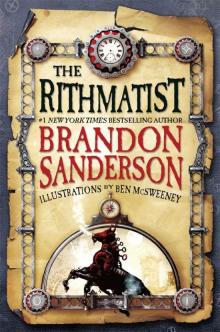 The Rithmatist
The Rithmatist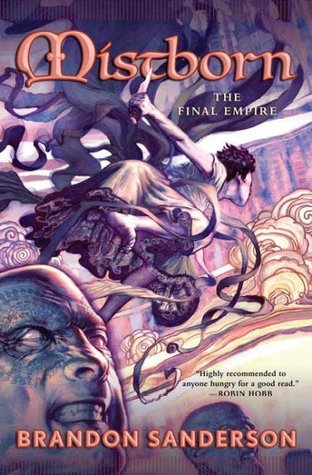 Mistborn: The Final Empire
Mistborn: The Final Empire Oathbringer
Oathbringer The Way of Kings
The Way of Kings Redemption
Redemption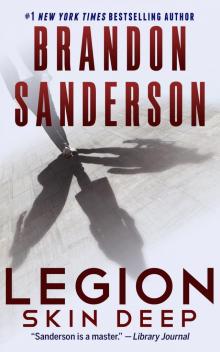 Skin Deep
Skin Deep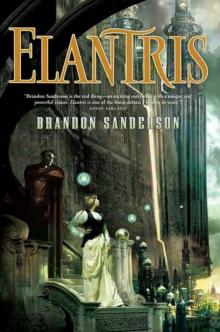 Elantris
Elantris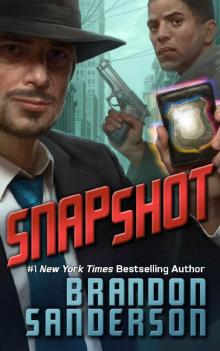 Snapshot
Snapshot Sixth of the Dusk (Cosmere)
Sixth of the Dusk (Cosmere)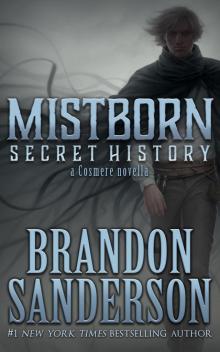 Mistborn: Secret History
Mistborn: Secret History White Sand, Volume 1
White Sand, Volume 1 Legion
Legion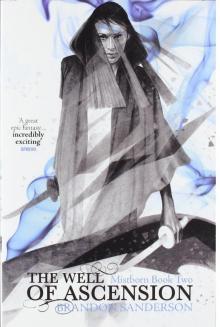 The Well of Ascension
The Well of Ascension The Bands of Mourning
The Bands of Mourning Words of Radiance
Words of Radiance The Hero of Ages
The Hero of Ages Calamity
Calamity Alcatraz Versus the Scrivener's Bones
Alcatraz Versus the Scrivener's Bones The Alloy of Law
The Alloy of Law The Emperors Soul
The Emperors Soul The Dark Talent
The Dark Talent The Gathering Storm
The Gathering Storm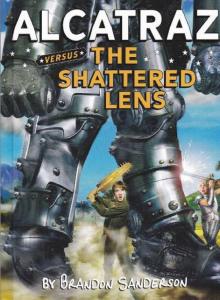 Alcatraz Versus the Shattered Lens
Alcatraz Versus the Shattered Lens Mitosis
Mitosis Alcatraz vs. The Evil Librarians
Alcatraz vs. The Evil Librarians Rhythm of War (9781429952040)
Rhythm of War (9781429952040)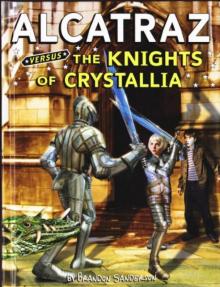 Alcatraz Versus the Knights of Crystallia
Alcatraz Versus the Knights of Crystallia Warbreaker
Warbreaker Firstborn
Firstborn Starsight
Starsight Edgedancer
Edgedancer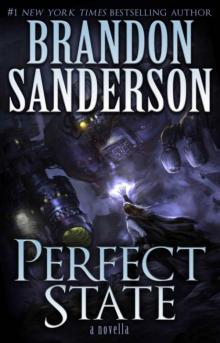 Perfect State
Perfect State Shadows of Self
Shadows of Self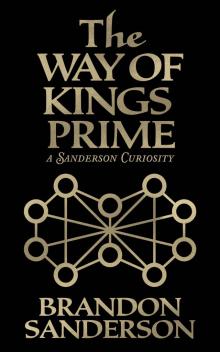 The Way of Kings Prime
The Way of Kings Prime Starsight (US)
Starsight (US) Shadows for Silence in the Forests of Hell
Shadows for Silence in the Forests of Hell Arcanum Unbounded: The Cosmere Collection
Arcanum Unbounded: The Cosmere Collection Awakening
Awakening Firefight
Firefight Dawnshard
Dawnshard Defending Elysium
Defending Elysium White Sand
White Sand Infinity Blade: Redemption
Infinity Blade: Redemption The Final Empire
The Final Empire Skyward
Skyward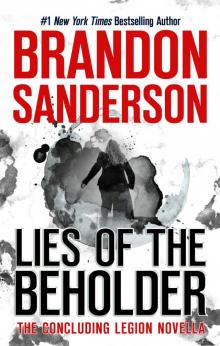 Lies of the Beholder
Lies of the Beholder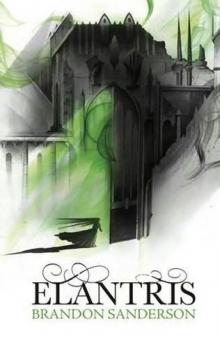 Elantris e-1
Elantris e-1 Steelheart r-1
Steelheart r-1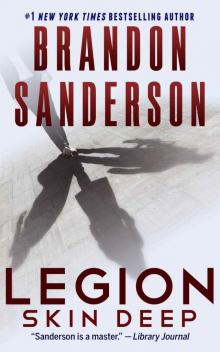 Legion: Skin Deep
Legion: Skin Deep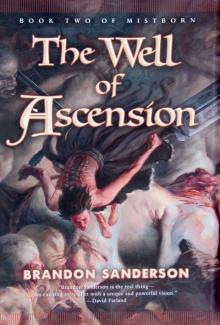 Well of Ascension
Well of Ascension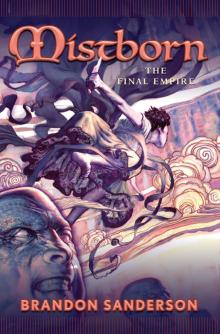 Mistborn
Mistborn Alcatraz versus the Evil Librarians
Alcatraz versus the Evil Librarians The Final Empire m-1
The Final Empire m-1 The Way of Kings (Stormlight Archive, The)
The Way of Kings (Stormlight Archive, The) Calamity (The Reckoners)
Calamity (The Reckoners) Legion and the Emperor's Soul
Legion and the Emperor's Soul Legion: The Many Lives of Stephen Leeds
Legion: The Many Lives of Stephen Leeds The Mistborn Trilogy
The Mistborn Trilogy Bands of Mourning
Bands of Mourning Alcatraz
Alcatraz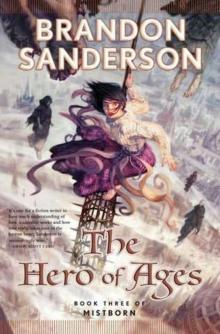 The Hero of Ages m-3
The Hero of Ages m-3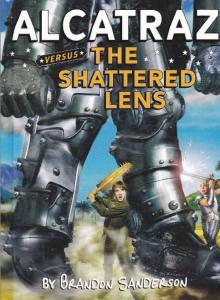 Alcatraz vs. the Shattered Lens
Alcatraz vs. the Shattered Lens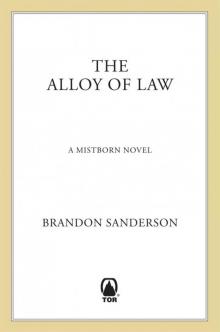 The Alloy of Law: A Mistborn Novel
The Alloy of Law: A Mistborn Novel The Way of Kings sa-1
The Way of Kings sa-1 Infinity Blade: Awakening
Infinity Blade: Awakening Sixth of the Dusk
Sixth of the Dusk The Stormlight Archive
The Stormlight Archive The Aether of Night
The Aether of Night